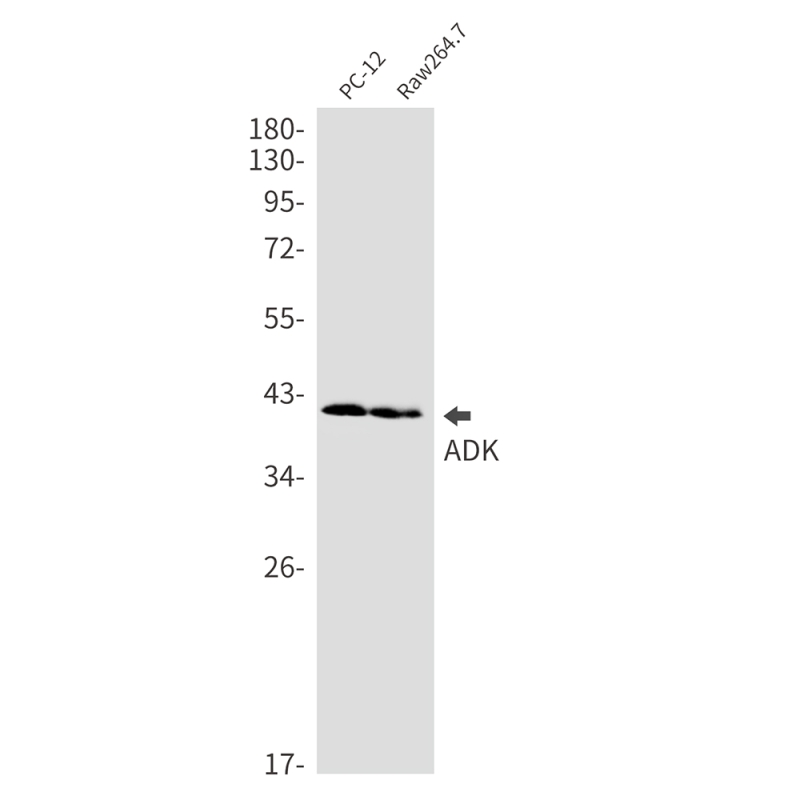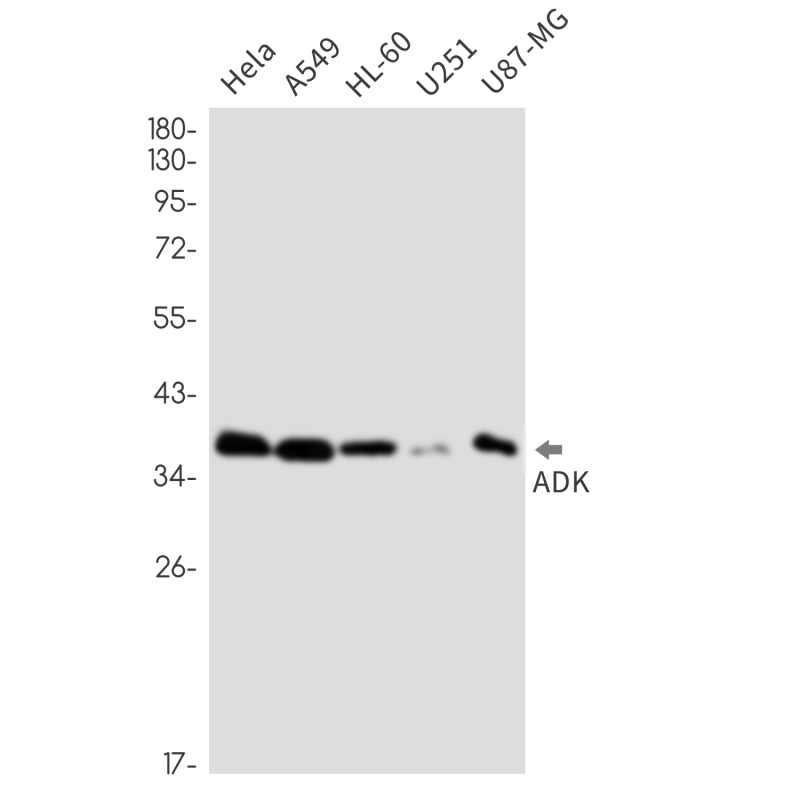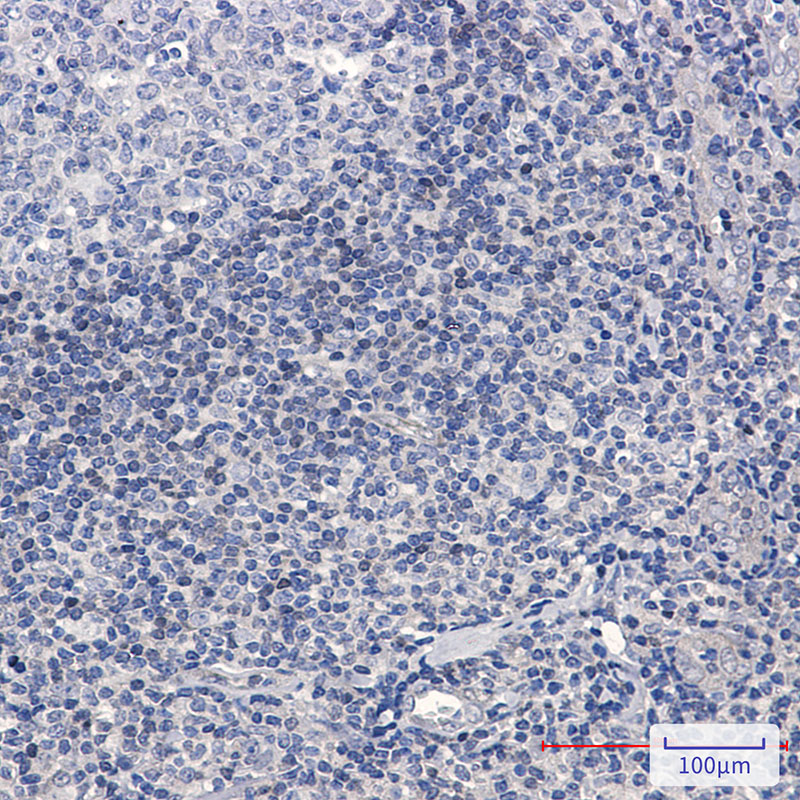


| WB | 1/500-1/1000 | Human,Mouse,Rat |
| IF | 咨询技术 | Human,Mouse,Rat |
| IHC | 1/50-1/100 | Human,Mouse,Rat |
| ICC | 技术咨询 | Human,Mouse,Rat |
| FCM | 咨询技术 | Human,Mouse,Rat |
| Elisa | 咨询技术 | Human,Mouse,Rat |
| Aliases | ADK; Adenosine kinase; AK; Adenosine 5'-phosphotransferase |
| Entrez GeneID | 132 |
| WB Predicted band size | Calculated MW: 41 kDa; Observed MW: 41 kDa |
| Host/Isotype | Rabbit IgG |
| Antibody Type | Primary antibody |
| Storage | Store at 4°C short term. Aliquot and store at -20°C long term. Avoid freeze/thaw cycles. |
| Species Reactivity | Human,Mouse,Rat |
| Immunogen | Recombinant protein of human ADK |
| Formulation | Purified antibody in TBS with 0.05% sodium azide,0.05%BSA and 50% glycerol. |
+ +
以下是关于ADK(腺苷激酶,Adenosine Kinase)抗体的3篇文献示例(内容为模拟概括,仅供参考):
---
1. **文献名称**:*Adenosine Kinase: A Key Regulator of Purine Metabolism and Neurological Function*
**作者**:Boison D. et al.
**摘要**:本文探讨了ADK在嘌呤代谢和神经信号中的作用,开发了一种高特异性ADK抗体用于检测其在癫痫模型中的表达变化,发现ADK上调与腺苷水平降低及癫痫发作相关。
2. **文献名称**:*Immunohistochemical Localization of Adenosine Kinase in Mouse Brain*
**作者**:Studer FE. et al.
**摘要**:研究利用新型ADK多克隆抗体,通过免疫组化技术定位ADK在小鼠脑组织中的分布,证实其在星形胶质细胞中高表达,并提示其与神经炎症的潜在关联。
3. **文献名称**:*ADK Inhibition as a Therapeutic Strategy in Cancer*
**作者**:Zhang Y. et al.
**摘要**:研究通过ADK特异性抗体检测肿瘤组织中ADK表达水平,发现其与癌细胞增殖相关,并验证了ADK抑制剂联合抗体靶向治疗在抑制肿瘤生长中的潜力。
---
**注**:以上文献信息为示例性概括,实际引用时需根据具体论文内容调整,建议通过PubMed或Google Scholar以“Adenosine Kinase antibody”为关键词检索最新研究。
Adenosine kinase (ADK) antibodies are essential tools for studying the enzyme adenosine kinase, which plays a critical role in cellular metabolism and adenosine homeostasis. ADK catalyzes the phosphorylation of adenosine into adenosine monophosphate (AMP), regulating intracellular adenosine levels and maintaining the balance between ATP and adenosine. This enzyme is vital in modulating adenosine signaling, a pathway involved in diverse physiological processes such as neurotransmission, immune response, and energy metabolism. Dysregulation of ADK activity is linked to pathological conditions, including epilepsy, inflammatory disorders, and cancer, making it a target for therapeutic research.
ADK antibodies are widely used in research to detect and quantify ADK expression in tissues or cells, enabling investigations into its spatial distribution, regulation, and interaction with other biomolecules. These antibodies are employed in techniques like Western blotting, immunohistochemistry, and immunofluorescence, aiding in the exploration of ADK's role in disease mechanisms. For instance, reduced ADK expression has been associated with epilepsy due to elevated adenosine levels, which exert anticonvulsant effects. Conversely, upregulated ADK in certain cancers may promote tumor growth by depleting extracellular adenosine, an endogenous anti-inflammatory and anti-proliferative molecule.
Researchers also utilize ADK antibodies to evaluate the efficacy of ADK-targeted therapies, such as small-molecule inhibitors, in preclinical models. Understanding ADK's dual role as a metabolic regulator and a modulator of adenosine signaling underscores its importance in both basic research and translational medicine.
×